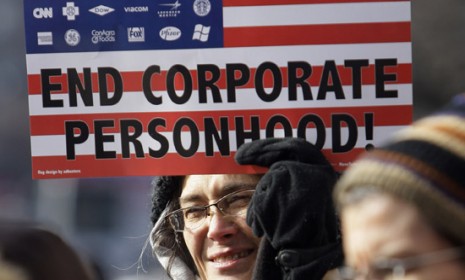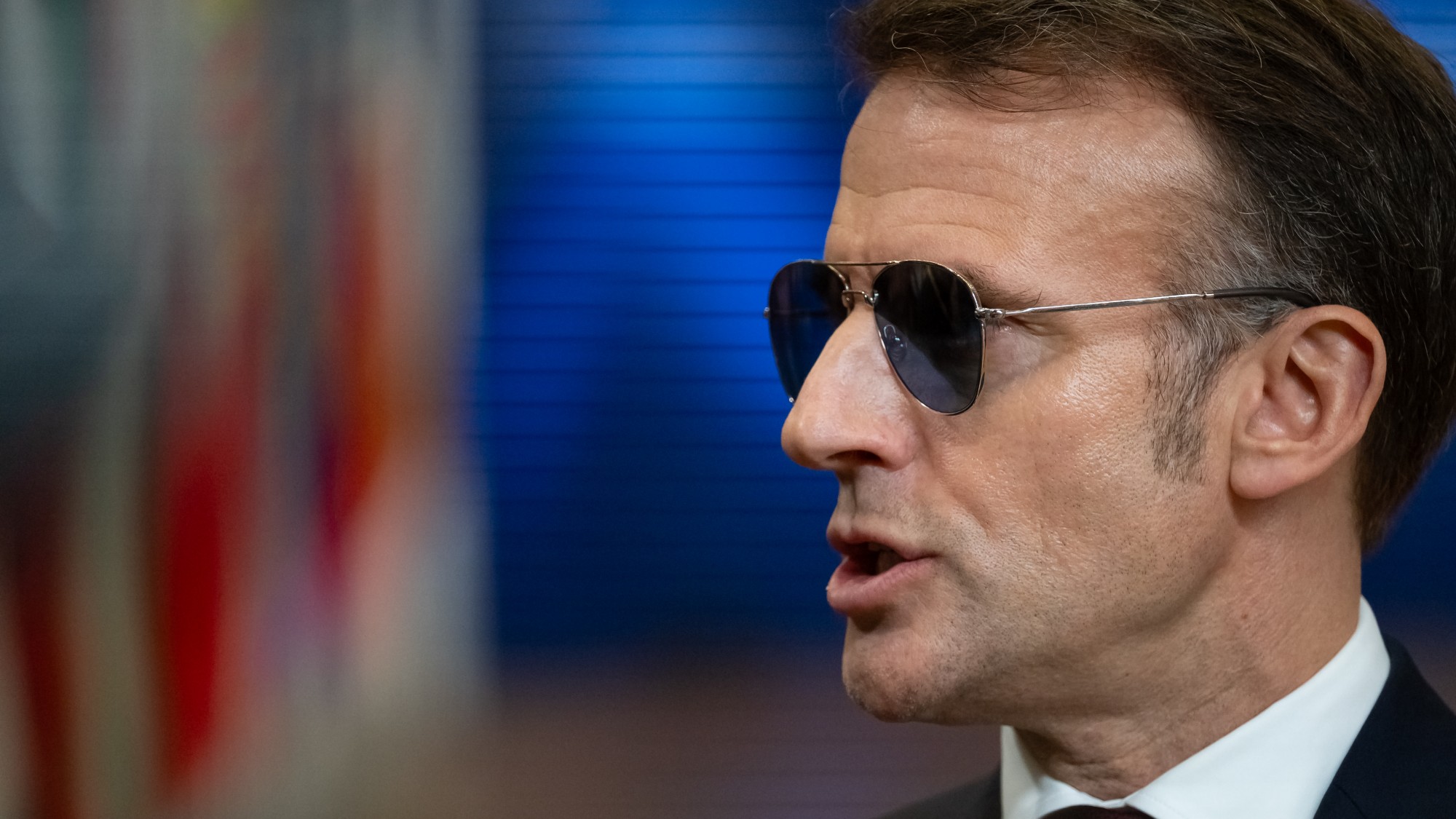The real story behind the Supreme Court's campaign finance showdown: 6 takeaways
The New Yorker reveals how conservative justices turned Citizens United from a minor case into one that would allow a flood of corporate money to influence elections

When Citizens United was first argued before the Supreme Court, in March 2009, "it seemed like a case of modest importance," says Jeffrey Toobin at The New Yorker. Less than a year later, in January 2010, the court handed down one of the most consequential decisions in its history, allowing corporations to spend unlimited amounts to support their candidates of choice. The ruling wiped out more than a century of legal precedent, and made the court a central force in the controversial dynamic between big business and government. Here, six takeaways from Toobin's report on the "behind-the-scenes struggle" that led to the court's decision:
1. An Obama lawyer committed an 'epic' error
The case was ostensibly about a hack-job documentary about Hillary Clinton, and whether Citizens United, a conservative group, could air the movie through video-on-demand under a campaign-finance law known as the McCain-Feingold Act. Citizens United did not challenge the law, arguing only that it applied to television commercials, not full-length documentaries. But when a lawyer for the Obama administration was asked by Justice Samuel Alito whether McCain-Feingold's bans on electioneering could apply to books, the lawyer answered, "Yes." The response, an incorrect one as it turns out, was an "epic disaster," says Toobin, and motivated the conservative justices to attack the entire law as an exercise in censorship.
The Week
Escape your echo chamber. Get the facts behind the news, plus analysis from multiple perspectives.

Sign up for The Week's Free Newsletters
From our morning news briefing to a weekly Good News Newsletter, get the best of The Week delivered directly to your inbox.
From our morning news briefing to a weekly Good News Newsletter, get the best of The Week delivered directly to your inbox.
2. Chief Justice Roberts tangled with Justice Souter
Chief Justice John Roberts let Justice Anthony Kennedy write an opinion that overturned much of McCain-Feingold, even though Citizens United's lawyer never raised any broad, First Amendment issues. Justice David Souter wrote a dissent accusing Roberts "of violating the court's own procedures to engineer the result he wanted," says Toobin, an "extraordinary, bridge-burning farewell to the court" that he would retire from later that year. Roberts withdrew Kennedy's opinion, fearing Souter's words could weaken the court's credibility.
3. Roberts outmaneuvered the liberals
Roberts came up with a "strategically ingenious maneuver" to sidestep Souter's objections. In a rarely used procedure, he called back the lawyers to argue the case a second time, and the second time around they were asked to address the broader First Amendment implications of McCain-Feingold. "As Roberts knew," says Toobin, "the conservatives would go into the second argument already having five votes for the result they wanted," even though the Obama administration withdrew its previous claim that the law extended to books and other media.
A free daily email with the biggest news stories of the day – and the best features from TheWeek.com
4. Roberts hid his role in the decision…
Kennedy was again assigned to write the court's opinion, a move that allowed Roberts to achieve "a far-reaching result without leaving his own fingerprints" on the decision, says Toobin. Roberts had only been confirmed by the Senate a few years previously, and it would have seemed hypocritical to overturn a century of precedent after he "made much of his judicial modesty and his respect for precedent." Roberts could count on Kennedy, a strict conservative on First Amendment issues, to deliver.
5. …But he was its mastermind
Roberts "more than anyone, shaped what the court did," says Toobin. "As American politics assumes its new form in the post-Citizens United era, the credit or the blame goes mostly to him." Judging by the results, it appears the court has given "moneyed interests the freedom to raise and spend any amount, from any source, at any time, in order to win elections."
6. The court is returning the U.S. to the Gilded Age
Citizens United shows the "extent to which modern conservatism is trying to restore the Gilded Age," when robber barons and industrialists ruled with impunity, says Joan Walsh at Salon. Roberts' determination to enhance corporate influence "shows the dramatic rightward — and backward — march of Republicanism over the last 30 years."
-
 Ukraine, US and Russia: do rare trilateral talks mean peace is possible?
Ukraine, US and Russia: do rare trilateral talks mean peace is possible?Rush to meet signals potential agreement but scepticism of Russian motives remain
-
 Syria’s Islamic State problem
Syria’s Islamic State problemIn The Spotlight Fragile security in prison camps leads to escape of IS fighters
-
 Quiz of The Week: 17 – 23 January
Quiz of The Week: 17 – 23 JanuaryQuiz Have you been paying attention to The Week’s news?
-
 The billionaires’ wealth tax: a catastrophe for California?
The billionaires’ wealth tax: a catastrophe for California?Talking Point Peter Thiel and Larry Page preparing to change state residency
-
 Bari Weiss’ ‘60 Minutes’ scandal is about more than one report
Bari Weiss’ ‘60 Minutes’ scandal is about more than one reportIN THE SPOTLIGHT By blocking an approved segment on a controversial prison holding US deportees in El Salvador, the editor-in-chief of CBS News has become the main story
-
 Has Zohran Mamdani shown the Democrats how to win again?
Has Zohran Mamdani shown the Democrats how to win again?Today’s Big Question New York City mayoral election touted as victory for left-wing populists but moderate centrist wins elsewhere present more complex path for Democratic Party
-
 Millions turn out for anti-Trump ‘No Kings’ rallies
Millions turn out for anti-Trump ‘No Kings’ ralliesSpeed Read An estimated 7 million people participated, 2 million more than at the first ‘No Kings’ protest in June
-
 Ghislaine Maxwell: angling for a Trump pardon
Ghislaine Maxwell: angling for a Trump pardonTalking Point Convicted sex trafficker's testimony could shed new light on president's links to Jeffrey Epstein
-
 The last words and final moments of 40 presidents
The last words and final moments of 40 presidentsThe Explainer Some are eloquent quotes worthy of the holders of the highest office in the nation, and others... aren't
-
 The JFK files: the truth at last?
The JFK files: the truth at last?In The Spotlight More than 64,000 previously classified documents relating the 1963 assassination of John F. Kennedy have been released by the Trump administration
-
 'Seriously, not literally': how should the world take Donald Trump?
'Seriously, not literally': how should the world take Donald Trump?Today's big question White House rhetoric and reality look likely to become increasingly blurred